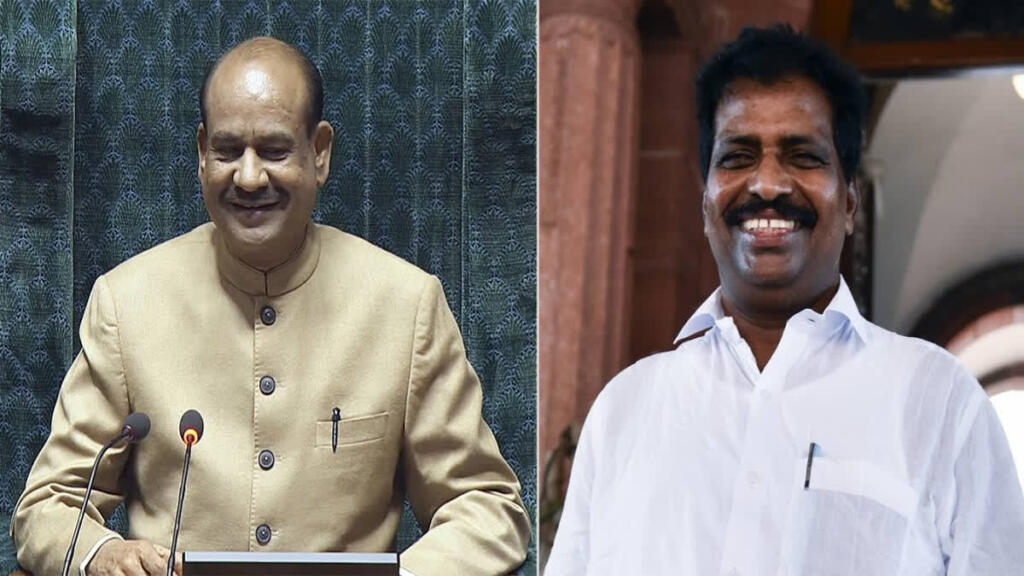Today, the Loksabha is set to witness an uncommon event – an election for the Speaker’s position. This occurrence, while infrequent in the house’s history, has been prompted by the Opposition’s decision to challenge the ruling party’s candidate. Despite the contest, the numbers seem to favor the government’s choice, setting the stage for an intriguing political showdown.
Candidates and Their Backgrounds
The election pits two experienced politicians against each other, each bringing a wealth of parliamentary experience to the table:
1. Om Birla: The Incumbent Speaker
– Represents the Bharatiya Janata Party (BJP)
– Three-time MP from Kota, Rajasthan
– Served as Speaker in the last Loksabha
– Known for his efforts to modernize parliamentary procedures
2. K Suresh: Congress’s Challenger
– Eight-term MP from Mavelikara, Kerala
– Nominated by the Congress party
– Brings extensive legislative experience to the contest
The BJP’s decision to nominate Om Birla again is seen as a strategic move to maintain continuity in the Speaker’s role. This choice underscores the party’s confidence in Birla’s ability to manage the house effectively.
Election Process and Numerical Advantage
The Speaker is chosen through a simple majority vote, based on the number of MPs present and voting. This democratic process ensures that the elected Speaker enjoys the confidence of the house. Currently, seven MPs cannot participate as they haven’t taken their oath yet, slightly altering the voting landscape.
The numerical breakdown stands as follows:
– NDA (ruling coalition): 293 MPs
– Opposition: 232 seats
– YSR Congress: 4 MPs (expected to support NDA)
This distribution gives the NDA a clear advantage in the election, making Om Birla the likely winner. However, the very act of contesting the Speaker’s position highlights the Opposition’s intent to challenge the ruling coalition at every turn.
Last-Minute Nomination and Political Maneuvers
The Congress made a surprising move by nominating K Suresh just ten minutes before the deadline. This eleventh-hour decision came after the party’s hopes for securing the Pro Tem Speaker and Deputy Speaker positions were dashed. The government had earlier appointed BJP’s Bhartruhari Mahtab as Pro Tem Speaker, contrary to Congress’s expectations for Suresh.
This last-minute nomination reflects the fluid nature of parliamentary politics and the Opposition’s determination to make its presence felt, even in the face of unfavorable numbers.
Opposition’s Stance and Government’s Response
Rahul Gandhi, a prominent Congress leader, claimed that Defense Minister Rajnath Singh had reached out for support but failed to address the Opposition’s claim to the Deputy Speaker post. Gandhi stated, “The entire Opposition said we would support, but convention is the Deputy Speaker should be from our side. Rajnath Singh said he would call back… but he has not yet.”
Meanwhile, the government, through Union Minister Kiren Rijiju, has made a final appeal for a consensus candidate. Rijiju expressed, “For the last two days, we have been in contact with main Opposition parties, talked to their floor leaders regarding the post of Speaker… We want the Speaker to be elected unopposed and through consensus.”
This exchange highlights the ongoing negotiations and the delicate balance between political contestation and consensus-building in parliamentary democracy.
Political Meetings and Party Positions
As the election approaches, both camps held separate meetings to strategize:
– Union Home Minister Amit Shah met with NDA allies to consolidate support
– The Opposition Bloc gathered at Congress chief Mallikarjun Kharge’s residence to finalize their approach
Notably, the Trinamool Congress expressed disapproval of contesting the election and planned to announce their stance by 9 am. This divergence within the Opposition ranks adds another layer of complexity to the electoral dynamics.
Significance of the Speaker’s Role
The Speaker of the Loksabha plays a crucial role in the functioning of India’s parliamentary democracy. As the presiding officer of the lower house, the Speaker is responsible for:
– Maintaining order during debates
– Interpreting and enforcing rules of procedure
– Ensuring fair and impartial conduct of proceedings
– Deciding on the admissibility of bills and resolutions
Given these critical responsibilities, the election of the Speaker carries immense significance for the smooth functioning of the Loksabha.
Conclusion: A Test of Parliamentary Democracy
As the Loksabha prepares for this rare Speaker election, all eyes are on the outcome. While the numerical advantage of the ruling coalition suggests a likely victory for Om Birla, the very act of contesting the position underscores the vibrancy of India’s parliamentary democracy.
The election serves as a reminder of the importance of checks and balances in the legislative process. It also highlights the ongoing tension between the ruling coalition and the Opposition, setting the tone for future parliamentary debates and legislation.
As the day unfolds, the Loksabha Speaker election will not only determine who presides over the house but also offer insights into the evolving dynamics of India’s political landscape. Whatever the outcome, it’s clear that the spirit of democratic contestation remains alive and well in the world’s largest democracy.
ALSO READ: Dhruv Rathee berated Sadhguru for …….?
